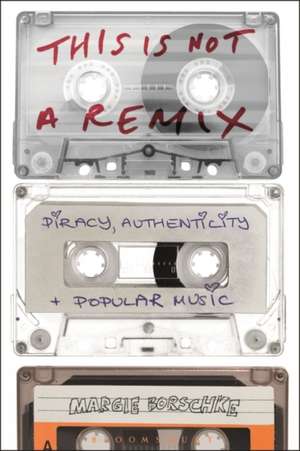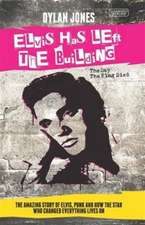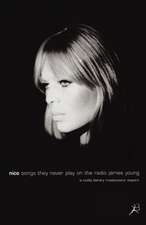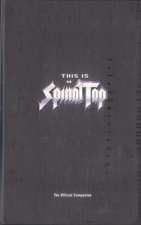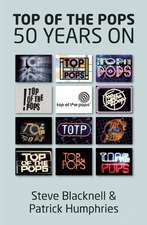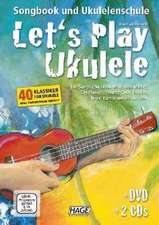This is Not a Remix: Piracy, Authenticity and Popular Music
Autor Margie Borschkeen Limba Engleză Paperback – 9 aug 2017
| Toate formatele și edițiile | Preț | Express |
|---|---|---|
| Paperback (1) | 165.03 lei 22-36 zile | |
| Bloomsbury Publishing – 9 aug 2017 | 165.03 lei 22-36 zile | |
| Hardback (1) | 567.58 lei 43-57 zile | |
| Bloomsbury Publishing – 9 aug 2017 | 567.58 lei 43-57 zile |
Preț: 165.03 lei
Preț vechi: 215.01 lei
-23% Nou
Puncte Express: 248
Preț estimativ în valută:
31.58€ • 32.77$ • 26.40£
31.58€ • 32.77$ • 26.40£
Carte disponibilă
Livrare economică 24 februarie-10 martie
Preluare comenzi: 021 569.72.76
Specificații
ISBN-13: 9781501318924
ISBN-10: 1501318926
Pagini: 192
Dimensiuni: 152 x 229 mm
Greutate: 0.3 kg
Editura: Bloomsbury Publishing
Colecția Bloomsbury Academic
Locul publicării:New York, United States
ISBN-10: 1501318926
Pagini: 192
Dimensiuni: 152 x 229 mm
Greutate: 0.3 kg
Editura: Bloomsbury Publishing
Colecția Bloomsbury Academic
Locul publicării:New York, United States
Caracteristici
Details and takes seriously practices of everyday media use in the pre- and post-network era, making visible a number of overlooked but influential and respected forms and practices in popular music culture including disco edits, mp3 blogs and other forms of collection and reuse
Notă biografică
Margie Borschke is Senior Lecturer in Journalism and Media at Macquarie University in Sydney, Australia. She studies contemporary and historical media use and how it contributes to the production of knowledge and culture.
Cuprins
1 This is not a remix 1.1 Introduction 1.2 Critical approach 2 Copy, a brief history 2.1 The ghost in the digital machine 2.2 The trouble with media history 2.3 "Again, back": Repetition and music's materiality 3 The rhetoric of remix 3.1 Remix as trope 3.2 The extended remix: In the press 3.3 The extended remix: Scholarly use 3.4 Lawrence Lessig's "Remix Culture" 3.5 Remix as resistance 3.6 Why the history of remix matters 4 Disco edits: Analog antecedents and network bias 4.1 What a difference a record makes 4.2 Interrupting the rhetoric of remix 4.3 Disco edits, a technical distinction 4.4 Hang the DJ 4.5 Walter Gibbons, the break, and the edits that made disco 4.6 Let your body talk 4.7 Are samples copies? 4.8 Parasites, pirates, and permission 4.9 Digital revival and an analog persistence 4.10 Credit to the edit 5 The New Romantics 5.1 Piracy's long history 5.2 MP3 blogs as social media 5.3 Material media: MP3 blogs as artifacts and practices 5.4 Provenance as metadata 5.5 Rethinking participation and the folk aesthetic 5.6 Countercultures and anticommercialism 5.7 Networking authenticity 5.8 Analog antecedents: Harry Smith's mystical collection 5.9 Copies, networks, and a poetics of encounter 6 Copies and the aesthetics of circulation
Recenzii
This Is Not a Remix will be useful not only for scholars of popular music but for any of those interested in music in their personal lives . Borschke's book indicates that there is much to be said about the long-standing genealogy of collective engagement with music that can literally be heard in our songs, mashups, and playlists.
This Is Not a Remix does raise some big issues and calls into question accepted wisdom regarding romantic notions of the current participatory recorded music scene.
Borschke's analysis of copying and remixing as it relates to popular music is fascinating and original, and the value of this book extends to those with an interest in media studies, intellectual property, and copyright.
This book contributes to the immediate topic of multiformats and provides an insightful and densely detailed exploration and analysis of the notion of copy ... this publication is valuable to our understanding of the complexities and nuances of living in a digital culture.
Offers interesting in-depth studies into DJ culture, mp3 blogs and the history of vinyl ... [and] provides useful insights into the nature of the copy in relation to remix. It is a fascinating read that provides much food for thought ... a valuable addition to the growing remix canon.
The most enjoyable section of This Is Not A Remix concerns the invention of the disco edit, particularly the specifics of legendary New York DJ Walter Gibbons's process of splicing together extended drum breaks in his makeshift home studio, then pressing the mix on acetate for use in clubs.
Margie Borschke's book offers an exciting new framework for thinking about digital copying of media, shifting the discussion from the now well known territory of intellectual property rights to the rich and complex history of the aesthetics of copying in both analog and digital media.
This inspiring and well-researched study really puts the disco in discourse, reminding of the long history of practices of copy that pertain to contemporary forms of cultural (re)production. Borschke's book makes a great contribution to critical studies of culture and also media archaeological research and is a warmly recommended for students and colleagues in music, sound and media studies.
This Is Not a Remix does raise some big issues and calls into question accepted wisdom regarding romantic notions of the current participatory recorded music scene.
Borschke's analysis of copying and remixing as it relates to popular music is fascinating and original, and the value of this book extends to those with an interest in media studies, intellectual property, and copyright.
This book contributes to the immediate topic of multiformats and provides an insightful and densely detailed exploration and analysis of the notion of copy ... this publication is valuable to our understanding of the complexities and nuances of living in a digital culture.
Offers interesting in-depth studies into DJ culture, mp3 blogs and the history of vinyl ... [and] provides useful insights into the nature of the copy in relation to remix. It is a fascinating read that provides much food for thought ... a valuable addition to the growing remix canon.
The most enjoyable section of This Is Not A Remix concerns the invention of the disco edit, particularly the specifics of legendary New York DJ Walter Gibbons's process of splicing together extended drum breaks in his makeshift home studio, then pressing the mix on acetate for use in clubs.
Margie Borschke's book offers an exciting new framework for thinking about digital copying of media, shifting the discussion from the now well known territory of intellectual property rights to the rich and complex history of the aesthetics of copying in both analog and digital media.
This inspiring and well-researched study really puts the disco in discourse, reminding of the long history of practices of copy that pertain to contemporary forms of cultural (re)production. Borschke's book makes a great contribution to critical studies of culture and also media archaeological research and is a warmly recommended for students and colleagues in music, sound and media studies.
